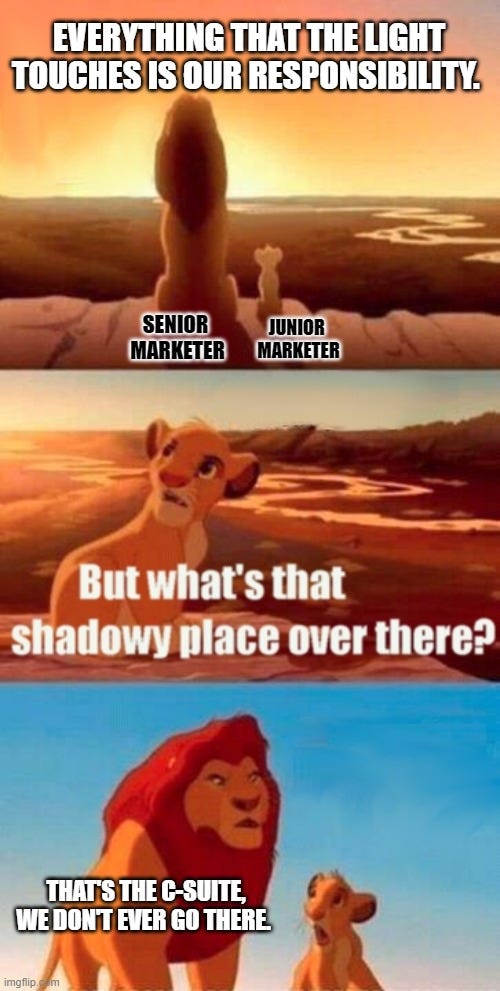MarketingDojo #53: 🎩 The Vanishing Act: CMOs in Crisis⏳
CMOs are an endangered species, B2B marketing benchmarks & TikTok as a search engine.
Hello Everyone,
Welcome to the 53rd issue of The Marketing Dojo!
Just like that, we have reached the end of January 2024. We are now officially allowed to roll our eyes if someone greets us with yet another "Happy New Year".
Here's what we will cover in today's issue:
🎭Meme-time: The case of missing CMOs
💸 The hidden costs of self-checkout
🔍TikTok Search Engine
📊 B2B Marketing Benchmarks
Before we dive in, here's a request - If you enjoy MarketingDojo, consider sharing it with one more person today.
Thanks a million! 🙏🚀
Meme-time: The Case Of The Missing CMO.
Trend whisperer.
Brand psychologist.
Numbers ninja.
Event ringmaster.
Budget tigtrope walker.
Compliance juggler.
Creative alchemist.
Reputation rescuer.
Powerpoint wizard.
Marketers have unlimited responsibilities that come with disappearing leadership roles.
Fortune Magazine published an article titled Fortune 500 companies are eliminating chief marketing officer roles as the position loses C-suite clout.
TL;DR: Companies such as UPS, Etsy, Walgreens, Lowe's, Hyatt Hotels, McDonald's, Johnson & Johnson, Uber, and Lyft have eliminated or merged the CMO role.
No clear and consistent definition of what marketing does and unrealistic expectations have ensured the CMOs have the shortest C-suite tenure.
It's frustrating, but at least we can chuckle about it with a meme!
Balancing Tech With Touch.
Convenience, speed and efficiency have propelled the usage of self-checkouts at retail. However, they're not without their drawbacks - Increased shoplifting & frustrations with malfunctions.
There is one more key disadvantage of self-checkouts - Fading customer loyalty.
The researchers of the study titled "Feeling rewarded and entitled to be served: Understanding the influence of self- versus regular checkout on customer loyalty" conducted five tests to check the hypothesis under varying circumstances and came back with four replicable findings:
Enhanced Loyalty with Regular Checkouts: Customers using staffed checkouts feel more valued and are more likely to return.
Perceived Effort and Entitlement: The checkout type affects loyalty because it instils a sense of being rewarded and treated as important customers
Basket Size Effect: The impact of the checkout type on loyalty varies with the basket size. This effect is weaker for smaller baskets.
Intervention Effect: Priming shoppers to view the extra effort involved in self-checkout as rewarding can equate their loyalty to regular checkout users.
For retailers, these findings highlight an opportunity. Implementing a hybrid model, where self-checkouts complement available staff assistance, especially benefits customers with larger purchases. This approach can significantly enhance loyalty and customer satisfaction.
Search, TikTok Style.
TikTok's use case as a search engine keeps getting stronger.
Adobe interviewed 808 customers & 250 business owners to quantify the current usage of TikTok for search. Here are some interesting numbers:
41% of the consumers interviewed have used TikTok as a search engine. Gen Zs are most likely to use TikTok for searches.
There's plenty of room for improvement, though - Google & YouTube still maintain their foothold on search - 91% & 39% of the respondents find their search most helpful on these platforms.
People who search on TikTok look for How-to-videos (69%), followed by personal stories(38%) & product reviews (36%).
Storytelling on TikTok varies significantly from other other search platforms. Creating how-to-videos or engaging influencers for users for content is a significant investment. But if your brand caters to GenZ audiences, search-optimizing your TikTok videos is a huge opportunity to drive sales.
How To Spend It: The B2B Edition.
Where did B2B marketers spend their budgets in 2023? And which of these channels gave them the best bang for the buck?
GTM analytics firm Hockeystack shared some insights in their B2B SaaS Marketing & Revenue Benchmarks report.
Budget Allocation: Google Ads (47.7%) and LinkedIn (45%) dominated the B2B marketing budget. Interestingly, there's a noticeable shift with more funds flowing into Facebook & LinkedIn ads, slightly reducing the share of traditional search advertising.
.
Engagement Metrics: Google search ads demonstrated high click-through rates of 2.2%, followed by Facebook at 0.96%, and Linkedin at 0.88%.
Lead Quality: When it comes to generating quality leads, LinkedIn outshines others. 36.2% of LinkedIn's Marketing Qualified Leads (MQL) progressed to sales opportunities. MQLto sales opportunities for Facebook, Bing, and Google were 22.7%, 22.3%, and 21.7%, respectively.
Looking ahead, B2B marketers will face significant challenges with Google - organic traffic reduction due to zero-click search generative experience & weaker ad targeting because of the rollout of cookie deprecation. Despite a price hike, all signs indicate a bright future for LinkedIn B2B ads in 2024.
Short Stuff:
X will now allow paid subscribers to post job opportunities. (X takes on LinkedIn).
Meta expands AI targeting (AI, AI everywhere).
LinkedIn is sunsetting Lookalike audiences targeting. (Farewell).
TikTok opens up livestreaming for accounts with under 1000 followers (Livestreaming boom starts).
That’s a wrap on this week. Thank you for your time and attention. If you liked this week’s newsletter or found something interesting - please give me a like or drop a comment. Your support helps drive the discoverability of the newsletter.
Once again, thank you for your time. See you in your inbox next Wednesday.
Regards,
Garima Mamgain
P.S:
Last week, I spent a lot of time going down the rabbit hole of the story & the aftermath of the latest ITV series, Mr Bates v/ Post Office.
What is the fuss about? Here's a TL;DR:
In 1999, the UK Post Office introduced a new Horizon software developed by Fujitsu. Soon after its implementation, money deposited at several post offices was reported missing. Around 700 subpostmasters were accused of stealing money, some of whom were imprisoned, and many of whom suffered severe financial and personal consequences.
Central to this story is one postmaster, Mr. Bates, who staunchly believed that the fault lay in the software. His court battle against the Post Office forms the crux of this series, showcasing a gruelling fight for justice.
The series has stirred strong emotions - within a week, 1 Mn people signed a petition calling for justice for those wrongly accused and prompted a response from UK PM Rishi Sunak to roll out a law for swift justice & compensation.
Two things stood out for me.
The entrenched belief in the infallibility of computer systems and how this misplaced trust can have life-altering impacts on individuals.
The power of storytelling
Here's a podcast or an article you can read about this fascinating story.







